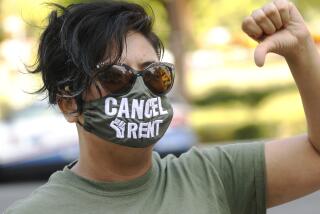Measure to Ban Bias Against AIDS Victims OKd by Council Panel
A proposal to ban discrimination against AIDS victims in Los Angeles sailed through a key council committee Tuesday after criminal penalties were removed from the ordinance.
The far-reaching ordinance--which will go before the full City Council today--would prohibit employers, landlords, businesses and medical facilities from discriminating against people suffering from acquired immune deficiency syndrome.
The proposal would provide for a city-financed hot line to process complaints and would subject violators to civil penalties.
Proponents of the measure say the ordinance, if passed by the council and signed by Mayor Tom Bradley, would become the first such law in the nation.
Moral Tone
“The important thing we are doing here is setting the moral tone for what ought to be done,” said Councilman Marvin Braude. “We should not act like these are medieval days and you are going to burn witches. . . . There are sound medical reasons not to discriminate against people with AIDS.”
Dr. Shirley Fannin, associate director of communicable disease control for Los Angeles County, agreed. She told council members Tuesday that the ordinance would underscore the fact that people cannot transmit AIDS through casual contact.
Councilman Joel Wachs, the leading sponsor of the ordinance, had pushed hard to retain the criminal sanctions in the ordinance. But other members of the Public Health, Human Resources and Senior Citizens Committee and city attorneys pressed to remove the criminal penalties, claiming that it might be hard to obtain criminal convictions and could unnecessarily complicate the ordinance.
Under the ordinance, landlords could not refuse to rent or lease units to any person with AIDS or a related medical condition. Nor could they evict any tenant who acquires the disease.
Employers, employment agencies and labor unions would be prevented from firing or refusing to hire people with AIDS as well as to segregate employees suffering from the ailment.
Businesses, such as restaurants, could not deny service to AIDS victims. Schools and other educational institutions would not be able to deny admission to AIDS victims. Also, medical offices, including dentists, would be prohibited from denying treatment to those who have AIDS.
Exempted Areas
But facilities such as blood banks and sperm banks would be exempted because the deadly ailment is known to spread through an exchange of body fluids--usually through sexual contact or blood transfusions.
“It’s making a point that we really ought to be rational and while we can’t control social or personal discrimination, we should be against institutional discrimination,” Fannin said.
“It’s a stand against irrationality and people being victimized by other people’s fears,” she added.
As the reported incidences of AIDS have mounted, its victims increasingly have felt a backlash of public fear. Responding to parental protests, for instance, Los Angeles County officials recently decided that a 3-year-old Redondo Beach AIDS victim should be tutored at home for a language disability rather than attend a public school. And a local AIDS counselor said recently that one of his clients had been asked by a West Hollywood restaurant to stop patronizing it.
Wachs, who first introduced the anti-discrimination measure last June, said the law is desperately needed. “Hardly a week goes by that one of my constituents, acquaintances or friends does not come down with AIDS. It’s a life-and-death situation.”
Representatives of the gay community also applauded the ordinance but they noted that AIDS is spreading to the heterosexual community as well. They said that the recommended law should be viewed not only as an ordinance to protect gays but also to combat a growing stigma attached to the disease.
“Discrimination and polarized anger still exist,” said Hugh Rice of the Los Angeles Gay and Lesbian Human Services Center.
In defining people afflicted with AIDS or related conditions, the ordinance said it will pertain to those where “an important part of (their) human immune system is destroyed” by the AIDS virus known as HTLV-III.
“Signs and symptoms of this disease complex are manifested in the afflicted person by a series of virus or fungus-caused illnesses of a chronic nature,” the law reads.
More to Read
Sign up for Essential California
The most important California stories and recommendations in your inbox every morning.
You may occasionally receive promotional content from the Los Angeles Times.










